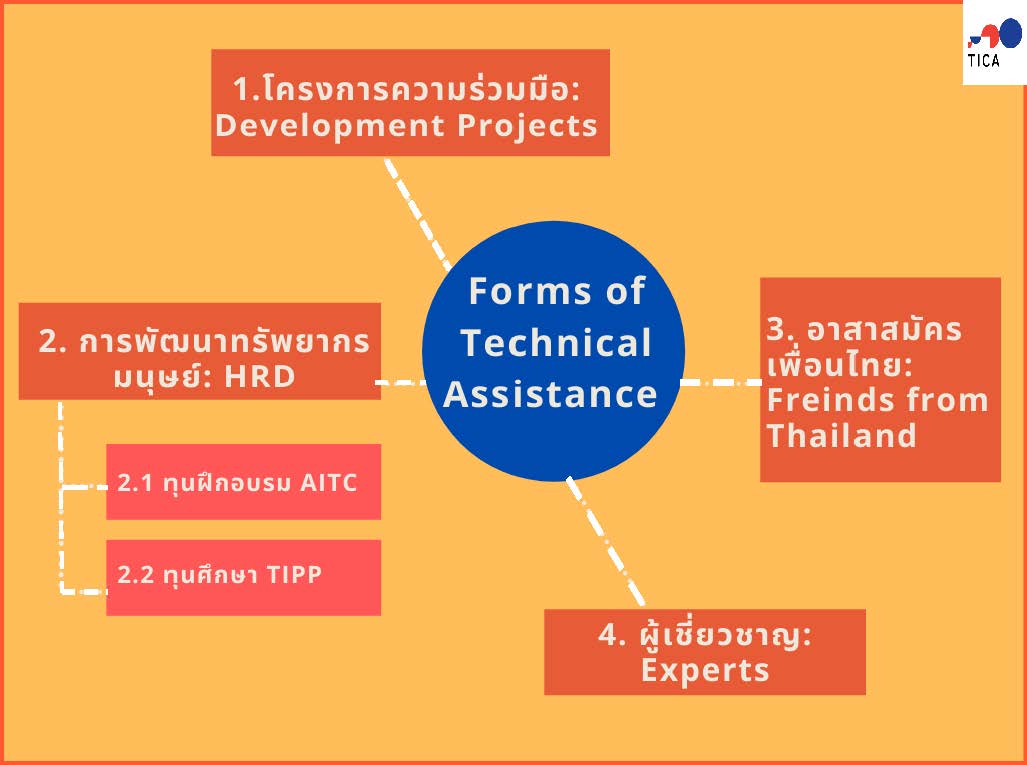Development Cooperation
Development Cooperation
Overview
Currently, TICA has 4 forms of development cooperation with other countries:

1.DEVELOPMENT PROJECTS
Moving forward to a sustainable future, TICA has implemented development projects in areas of Thailand’s expertise across multiple continents, including Asia and the Pacific, the Middle East, Africa, Central and Latin America.
TICA’s projects are result-oriented and practical, focusing on concrete deliverables and human resources development. TICA aims to respond to our partner countries’ development priorities and needs, thus we encourage engagement and ownership at both national and local levels in order to enhance resilience and sustainability of the target communities, agencies, and institutes. Activities are carried out according to shared objectives, goals, and the expected scale of impact.
Through past successful projects and experiences, TICA and our partner countries are better equipped to deliver effective ongoing and future projects in social and economic sectors, as evident in some of the following highlights:
Social Sector
Public health: improvement of healthcare service and hospitals; strengthening capacity of health personnel; development of hospitals’ emergency department; strengthening preparedness and response to the COVID-19 pandemic; enhancing cooperation along border areas;
Education: curriculum development and training across educational levels including vocational, higher education; strengthening capacity of educational institutions, teaching professionals and educators;
Economic Sector
Local product development, SMEs & economic and trade development: One Village One Product development; curriculum design and training; SMEs and product marketing & business strategies; agro-processing and agri-business development; international workshop for trade policy and trade negotiations;
Tourism and tourism-related areas: sharing of best practices on health, wellness, and Community-Based Tourism (CBT); development of eco-tourism, gastronomy workshop; curriculum design and training on hotel hospitality;
Environment, science and technology: use of a parabolic greenhouse solar dryer for preserving agricultural products; construction of artificial reefs; enhancing air quality management by reducing the levels of PM2.5;
Agriculture and fisheries & aquaculture: improvement of farmers’ livelihood through enhancing agricultural productivity; development of shrimp culture demonstration center; enhancing fisheries and aquaculture production; farm and soil management for agricultural production;
Workforce & Skills development: skills curriculum design and training (short courses, diploma, and degree programs); training of the trainers; management and administration of skills development institutions.
2.HUMAN RESOURCES DEVELOPMENT (HRD)
Capaity building is at the core of social and economic development which Thailand can offer and share experiences in the areas of expertise, e.g., the Sufficiency Economy Philosophy (SEP), public health, food security, climate change, and SDGs-related fields. TICA’s main human resources development programs include:
Annual International Training Courses (AITC)
Over the years, short-term and fully funded training courses offered through AITC have attracted applications from Asia and the Pacific, the Middle East, Africa and Latin America. These courses vary from year to year as TICA seeks to make AITC courses relevant to the contemporary contexts and latest international trends.
Thailand International Postgraduate Program (TIPP)
TICA provides fully funded postgraduate scholarships for candidates from developing countries to study at universities and academic institutions in Thailand.
Bilateral cooperation (individual request) and Trilateral Cooperaton Programs
TICA provides scholarships and technical trainings based on bilateral cooperation programs with partner countries (individual request) as well as trilateral cooperation programs with other countries or international organizations for the third countries. While most scholarships under these programs are fully funded, some are under a cost-sharing mechanism depending on mutual agreement.
3.DISPATCH OF THAI EXPERTS
Throughout many years along our development path, from being a recipient to becoming an emerging donor, Thai development experts have accumulated knowledge, know-hows, and expertise in key sectors that reflect Thailand’s experience. TICA has worked hand in hand with our experts who play integral roles in our partner countries’ sustainable development.
TICA’s experts contribute to development by way of knowledge sharing, onsite-training, providing research and technical advice as well as guidance on project planning, implementation, and monitoring, among others. These are crucial to the effective delivery of development efforts and cooperation.
4.FRIENDS FROM THAILAND (FFT) VOLUNTEER PROGRAM
Throughout the years, promoting development through lasting connections has proven to be a powerful tool. As such, the Friends from Thailand (FFT) Volunteer Program was launched in 2003 to compliment the works of Thai experts and to further strengthen Thailand’s international development cooperation. The program aims to enhance cultural understanding, mutual trust, and foster people-to-people ties between Thailand and our partner countries.
Each year, a number of Thai volunteers, ages between 21 to 35 years old, are selected to work for a period of 1 or 2 years under TICA’s various development projects, at the relevant agencies or field stations in our requesting partner countries.
Our FFT volunteers’ works range from assisting the Thai Language Teaching Program, working alongside local farmers in TICA’s agricultural projects, to conducting activities in various fields such as public health and community development.
5 OTHER ACTIVITIES / PROJECTS
TICA has also been active in expanding the scope of our development initiatives and activities. Examples include:
The Buakaew Roundtable International Program aims to provide both a conceptual framework and application of Thailand’s proven development approach. TICA hosts government officials from various partner countries who participate in briefings and study visits to different regions of Thailand to gain first-hand knowledge of how our development strategies, particularly the Sufficiency Economy Philosophy (SEP), are applied in local contexts.
Exhibitions, side-events and publications are parts of our global partnership and networking. TICA has supported and co-hosted exhibitions and side-events at a number of regional and international conferences. Equally important, TICA has partnered with United Nations Office for South-South Cooperation (UNOSSC), United Nations Volunteers (UNV), and the private sector to produce South-South in Action publications, featuring Thailand’s development experiences, best practices, including the application of SEP, and volunteer program.
กรมความร่วมมือระหว่างประเทศ